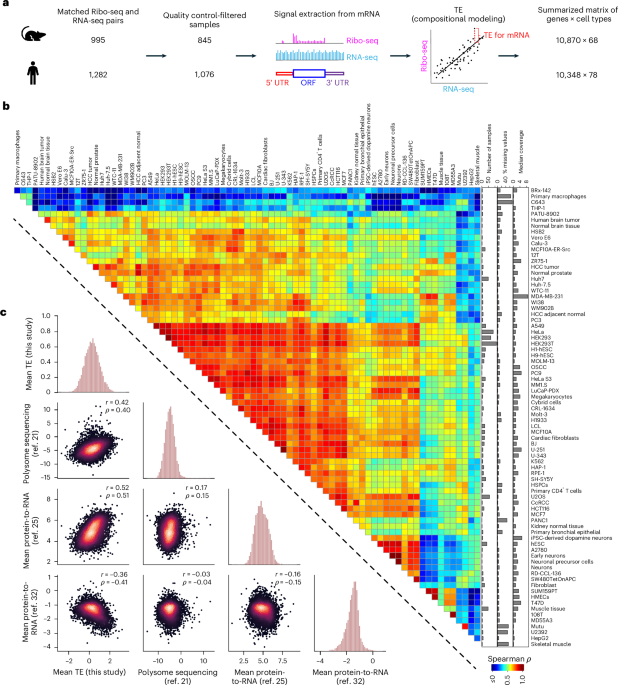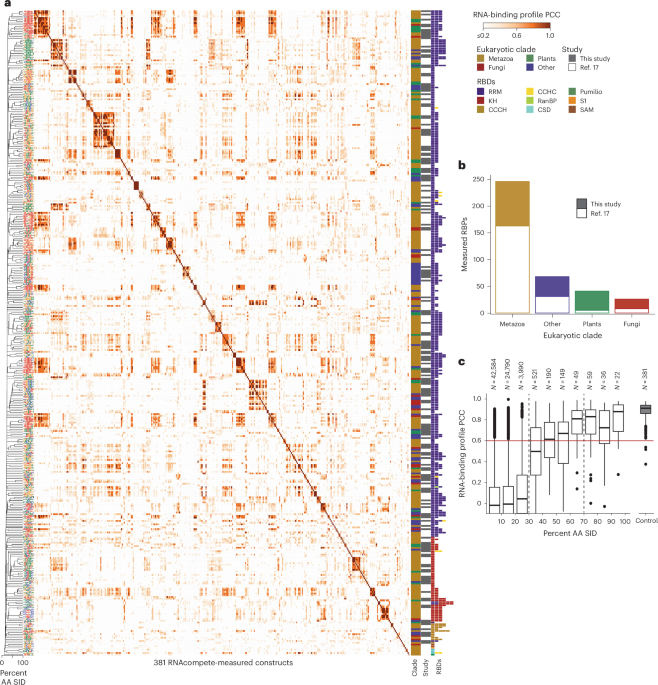Now Reading: Decoding mRNA Translation Efficiency in Mammalian Cells
-
01
Decoding mRNA Translation Efficiency in Mammalian Cells
Decoding mRNA Translation Efficiency in Mammalian Cells

swift Summary
- Teh references highlight a series of studies employing deep learning and machine learning techniques to analyze and predict gene regulation, translation efficiency, and RNA dynamics.
- Researchers explored variant effects on gene expression, modeled ribosome distribution using neural networks, predicted mRNA abundance from DNA sequences, and studied determinants influencing translation accuracy.
- Studies leveraged convolutional neural networks (CNNs) for regulatory activity across chromosomes and examined interaction effects to enhance predictions of gene expressions.
- Scholarly contributions also included predictive modeling for transcription initiation coded by DNA sequences as well as advancements in understanding mRNA degradation rates in mammals.
Indian Opinion Analysis
The compilation of these cutting-edge studies underscores the rising intersection between computational biology and artificial intelligence-a space with enormous potential for submission in genomic research. For India, leveraging technologies like deep learning frameworks within domestic research ecosystems could accelerate healthcare innovation or pharmaceutical growth tied to personalized medicine based on genomic insights. Policies fostering collaboration across biotechnological domains paired with government support would be pivotal in ensuring that Indian laboratories remain competitive globally while addressing solution-oriented challenges such as disease prevention or treatment targeting genetic predispositions.
Source: Click hereIt truly seems the raw text provided does not directly contain news content related to India or a specific topic.Instead, it appears to include bibliographic references and academic citations, primarily focused on mRNA translation research and protein synthesis studies.
for me to assist you as an AI-powered editor for Indian Opinion, please provide relevant news-related content on India. I will then craft a Quick Summary and Indian Opinion analysis based on that input.
Let me know if you’d like further assistance!Quick Summary:
- The article discusses advancements in genomics and the regulatory mechanisms impacting eukaryotic translation, transcription, and protein synthesis.
- It highlights key studies analyzing mRNA-to-protein differences, factors influencing ribosomal activity, and codon optimization in humans.
- Methods such as ribosome profiling have enhanced understanding of cellular responses to genetic variability and pathogen interactions.
Indian opinion Analysis:
The research insights into mRNA translation efficiency significantly contribute to understanding genetic regulation across human tissues. for India,which is investing in genomic research through initiatives like Genome India Project,these findings could serve as a benchmark for deeper exploration of personalized medicine or agriculture-based applications driven by climate resilience needs. With India’s aspirations in biotechnology innovation ecosystems growing rapidly,leveraging global research could reinforce its preparedness for future health challenges or bio-technological solutions.
Read more: Google Scholar ReferenceQuick Summary
- No specific news updates or relevant information about India provided in the text.
- The article primarily lists references from diverse research papers on mRNA stability, codon bias, tRNA abundance, translational control mechanisms, and associated technologies.
Indian Opinion Analysis
The article does not explicitly discuss events or issues concerning India but focuses on molecular biology studies at a granular level. Such research can serve as the backbone for advancements in biotechnology and medical sciences globally, areas where India possesses growing capability. India’s potential to leverage these findings for biopharmaceutical innovation could take forward its ambitions of being a leader in scientific research while fostering cross-border academic collaborations. More focused context surrounding Indian contributions to these topics would have made this analysis more grounded.
For additional references and full access to the material: PubMed CentralQuick Summary
- The article provides a collection of references related to various studies in molecular biology, genetics, and bioinformatics.
- Topics include ribosome profiling data analysis, translational regulation mechanisms in human tissues, impacts of gene length on protein synthesis, ribosomal reinitiation processes, mRNA translation efficiency across cell types, cellular stress responses during translation elongation states, and more.
- These studies utilize methodologies like ribosome profiling, hydro-tRNAseq sequencing techniques for tRNA observation in humans and zebrafish development analytics.
- research efforts aim to deepen understanding of biological regulatory mechanisms relevant to health and disease across organisms like mammals.
Indian Opinion Analysis
India’s burgeoning biotech research ecosystem can benefit significantly from such advanced global scientific findings. by leveraging insights into topics like translational control via the start codon-specific process or conservation within mammalian transcriptomes efficient protein modeling new therapeutic applications emerge stronger scalability inclusive answers holistic discipline whether focusing developmental genetics strategic enhancer essential academic bilateral..Chief Read full-text case >Quick Summary
- The news article focuses on various genetics and molecular biology studies that highlight the impact of untranslated regions (UTRs) of mRNA on diseases, protein synthesis, and genetic expression.
- Research includes findings related to 5′ UTR mutations causing defects in translation processes tied to intellectual disabilities, inherited retinal diseases, and predispositions to conditions like melanoma.
- Key studies explore mechanisms such as aberrant initiation codons from mutations or translational disruptions due to single nucleotide polymorphisms (SNPs).
Indian Opinion Analysis
The advancements described uncover notable genetic pathways that impact disease prevalence globally. From an Indian perspective, better knowledge of UTR-related pathological mechanisms may enhance diagnostic capabilities and precision medicine efforts. Considering India’s unique genetic diversity and high burden of hereditary conditions, incorporating such findings into domestic healthcare research can spur locally relevant innovations in treatment strategies for rare diseases. Investments in genomic technologies coupled with global collaborations could accelerate India’s role in frontier medical science developments.
Read more at PubMed Central.The text provided doesn’t contain information about a news article related to India but is rather a scholarly reference list discussing molecular cell and genetic research. Please provide the raw text of an appropriate article so I can generate the requested sections: Quick Summary and Indian Opinion Analysis.Quick Summary
- The source text primarily lists a series of scientific studies focused on molecular biology, particularly translation processes, mRNA regulation, and ribosomal activity.
- Studies explore topics like poly(A)-tail profiling in embryonic translation control (Nature 2014), determinants for elongation rates during protein synthesis (PNAS 2019), and the interplay between mRNA translation and decay mechanisms (Cell Rep. 2024).
- Publications include findings that codon usage regulates initiation rates and how nascent polypeptide charges influence translational dynamics.
Indian Opinion analysis
India has been increasingly investing in scientific research across fields like genomics and molecular biology to address national health challenges such as genetic disorders or metabolic diseases. The extensive global research highlighted here underscores the foundational insights critical for building cutting-edge technologies in diagnostics or therapeutics within India’s growing biotech sector.Beyond healthcare applications, advancements in understanding mRNA regulation could possibly align with India’s ambitions in vaccine development-an area demonstrated by its strong performance during COVID-19 vaccine production. However, continued investments into interdisciplinary collaboration are essential if Indian scientists hope to contribute actively at this global forefront.
Read more: Source LinkQuick Summary:
- The source consists of complex references covering studies in molecular biology, translation efficiency, mRNA decay mechanisms, ribosome profiling experiments, and related tools/methodologies.
- Topics include mechanisms like codon-mediated mRNA degradation,ribosome slowdown impacts,translation inhibitors affecting profiling experiments,and protein synthesis dynamics.
- Highlights include references to innovations in algorithms (LightGBM), deep learning applications (RiboNN), and interpretable AI libraries for scientific inquiries like captum.
- Specific examples: UniProt as a worldwide resource for proteins knowledgebase described in 2021 findings; advancements in APPRIS for selecting functional isoforms.
Indian Opinion Analysis:
The academic depth of the referenced studies sheds light on India’s growing meaning in global research collaboration landscapes. Tools like LightGBM and Captum further highlight how artificial intelligence intersects with biosciences-a domain that India recognizes as crucial to advancing biotech-related industries. With enterprising initiatives like National Biotechnology Development Strategy 2021-2025 already underway by the Indian government, integrating such frontier science work could enhance domestic capabilities.Moreover importantly.Potentially!Quick Summary:
- The article focuses on advancements in computational biology, specifically tools like Biostrings.
- Biostrings is described as an efficient software for the manipulation of biological strings.
- Developed under the Bioconductor project, this tool promises streamlined handling of DNA and RNA sequences for research purposes.
- The creators mentioned include Pagès, Aboyoun, Gentleman, and DebRoy.
Indian Opinion analysis:
Advances in computational biology hold significant implications for India-a country with growing investments in biotechnology research and development. Tools like Biostrings can enhance data analysis efficiency within Indian academic institutions and labs working on genetic studies or healthcare innovations. As India seeks prominence in genomic medicine and bioinformatics globally, adopting cutting-edge resources like this will be crucial to maintaining competitiveness while fostering scientific advancements domestically.
























